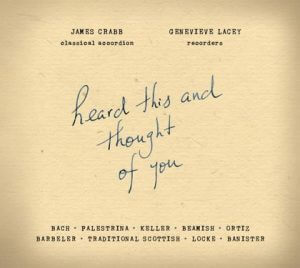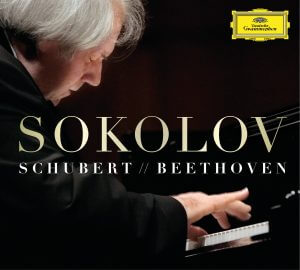James Crabb (classical accordion) /Genevieve Lacey (recorders)
ABC Classics 481 1874
TPT: 71’43”
reviewed by Neville Cohn
 Notions of a wheezing classical accordion in combination with the tweeting tones of a soprano recorder might seem to some a less-than-delightful sonic mixture. But I’d say it would need only a few moments to persuade even the grumpiest listeners that with these two top performers on the job, musical magic is on offer.
Notions of a wheezing classical accordion in combination with the tweeting tones of a soprano recorder might seem to some a less-than-delightful sonic mixture. But I’d say it would need only a few moments to persuade even the grumpiest listeners that with these two top performers on the job, musical magic is on offer.
Indeed, the artistry brought to bear on these instruments is such that these odd musical bedfellows work wonders. The result of their endeavours is frankly a delight in a compilation brimming with charm and gentle sonic ideas, some of the offerings reaching back as far as the 16th century – and a few items which might be thought of as having been composed as recently as yesterday afternoon.
Recercada segunda by Diego Ortiz (he died around 1570) is jovial and charm-laden, a delightfully busy item. Recercada primea is its melancholy partner. Where is everybody? – composed two years ago by Andrea Keller – is very much of the here and now, a sombre and rather depressing utterance.
Listen to Damian Barbeler’s Shadow Box (2013-2014). It’s beautifully written, utterly engrossing as if emanating from a piper in some remote, faraway place.
Lacey and Crabb are in fine fettle in an arrangement on J.S.Bach’s Organ Sonata No 3 in D minor proving yet again the extraordinary universality of so much of Bach’s music; it sounds just as effective and meaningful in this arrangement for recorder and accordion. Reflective in the slow movement and nimble and accurate in the finale, Lacey and Crabb do Bach proud.
Crabb’s arrangement of Sally Beamish’s Lament comes across as an essay in visceral melancholy, music infused with sadness. A little of Palestrina’s Vestiva i colli goes a long way; it is overlong for its material and outstays its welcome.
Two traditional Scottish pieces are a toe-tapping finale. Momentum is most effectively maintained; it‘s an engaging, quirky offering.


